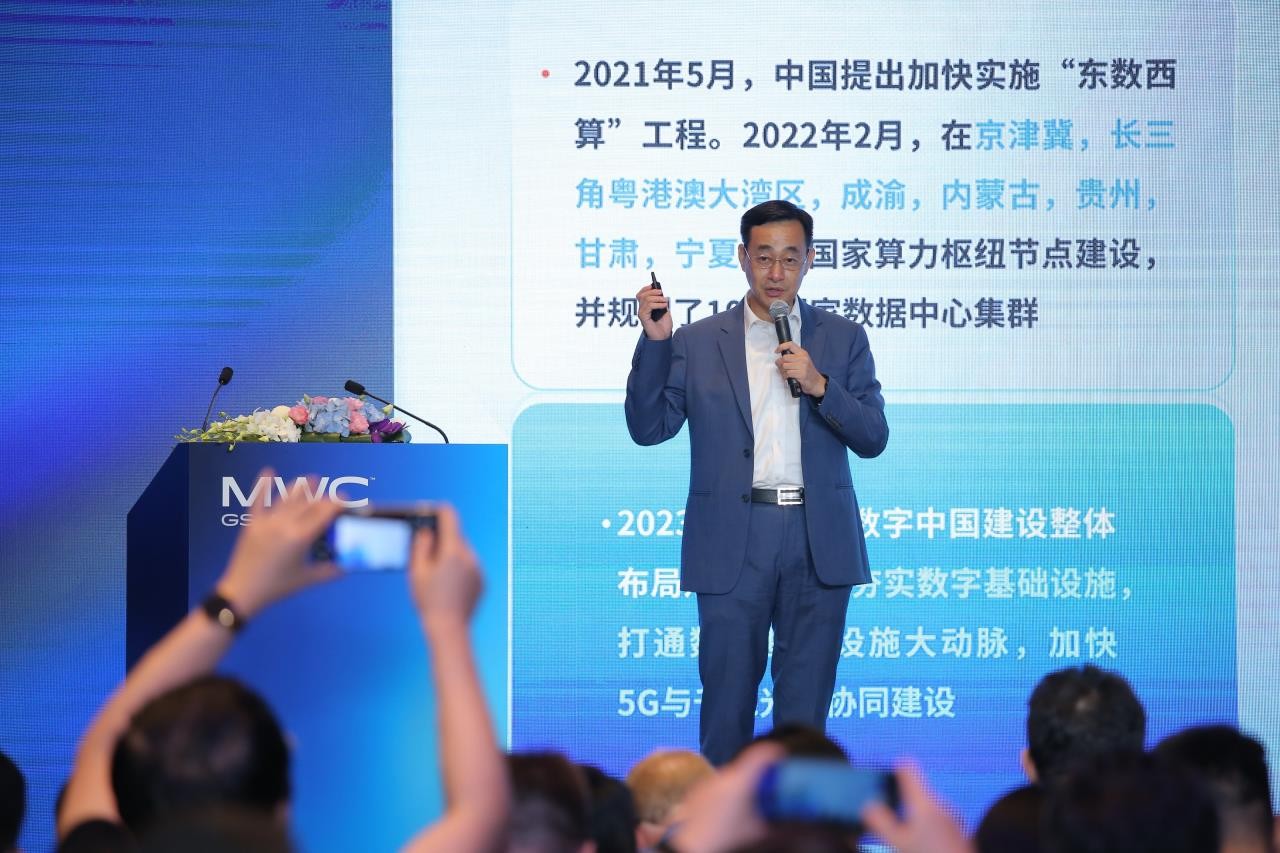The game-changing generative AI platform, ChatGPT, has been launched and all the rage around the world this year. It is a powerful testament of significant potential of social economy transformation. It is expected that the industrial digital transformation will be further accelerated as these emerging digital technologies keep developing.
At the MWC Shanghai 2023 “Digital Everything Summit – Building Digital Nations”, Mr. Nie Lei, Vice President of YOFC made a speech. “The digital economy has now been the major driving force for the GDP growth worldwide. It is expected that the proportion of global digital economy in GDP will rise to 62% in 2023”. He also argued that digital infrastructure with larger bandwidth, lower latency and higher reliability is essential in response to the data explosion following the emerging digital requirements and services.

China highly values the construction of digital infrastructure. We launched a project to Channel Computing Resources from the East to the West last year, and issued a plan for the overall layout of the country's digital development this year, steering digital development in the strategic direction with well-planned top design. In terms of detailed route, Mr. Nie Lei believed “Optical network stands for the optimal solution to connect various industries as it is set apart from others with large capacity, long distance and wide coverage for communication, and long service life”.
BRIGHTS All-Optical Connection Proposed by YOFC
Optical network interconnection is the foundation for network communication, whether it is residential broadband or corporate dedicated lines, 4G or 5G, or even the high-speed interconnection between data centers. In recent years, the collaboration between 5G and optical network has been a key momentum for industrial digital transformation.
China is far ahead in network communication development with the largest-scale optical network infrastructure and more than 100 million gigabit broadband subscribers. YOFC is the largest supplier of optical fibre in China and beyond. As Mr. Nie Lei introduced, YOFC has been the global market leader in its major businesses of optical fibre preform, fibre and optical cable since 2016, delivering up to 920 million fkm optical fibres.
On this basis, YOFC came up with the BRIGHTS all-optical connection concept. According to Mr. Lei Nie, just like the Beijing-Hangzhou Grand Canal which connects the Yangtze River and the Yellow River and boosts the bi-lateral economic and cultural exchanges as a major south-north transport artery, the BRIGHTS all-optical connection project is expected to be an artery of science and technology to connect the infrastructure and industries across China for quality development of the digital economy.
G.654.E new-generation trunk fibre has been rolled out to make BRIGHTS all-optical connection possible. Mr. Nie Lei introduced that this fibre, featuring low non-linear effects and low attenuation, allowing large-bandwidth, low-latency, long-span backbone network transmission, is preferred for 400 Gbps, 800 Gbps, and Tbps ultra-high-speed transmission. Currently, G.654.E fibre has been used in network infrastructure construction by China Mobile, China Telecom, China Unicom, State Grid, and even adopted by many countries.
Besides, YOFC has launched a broad portfolio of optical cable products, including large-core, micro-cluster, air-blown, indoor, all-dry and more optical cables, which can improve the construction efficiency of urban digital infrastructure. A full-optical data center is established to tackle the high computing power requirements. FTTR brings gigabit optical network to every corner of indoor spaces, making work more efficient and life easier.
Based on its various fibre products and solutions for different scenes, YOFC has fueled the industrial digitalization in both China and overseas. In the Philippines, with the construction of full-optical backbone network and FTTH network, the national broadband penetration rate rises from 3.4% to 19%. In Peru, YOFC has deployed more than 7,800 km of optical cables, laying a solid digital foundation for local economic and livelihood development.
New Fibres Are Future-proof
We have our feet on the ground, and keep our eyes on the stars. The digital economic achievements made today may only represent as a starting point a decade later, as the computing power is predicted to increase a hundred times in the next decade.
This means more robust optical network infrastructure is required. To ride on this wave, YOFC has had a head start in developing and manufacturing the new types of fibres such as multi-core fibres and hollow-core fibres.
As Nie said, multi-core fibres can increase the communication capacity by 4 to 8 times under the same single-channel rate, making it suitable for high-density, large-capacity optical connections with a transmission speed of 800 Gbps or even 1.6 Tbps. YOFC has introduced a full series of space-division multiplexing fibres, including multi-core, few-mode, and orbital angular momentum fibres, and also products such as multi-core fan-in and fan-out, few-mode multiplexers, and space division multiplexing fibre connectors of multiple specifications.
Hollow-core fibres are widely recognized for advantages such as low latency, low nonlinearity, and low dispersion, and are expected to carry the next-generation optical network of ultra-high bandwidth and ultra-low latency in next decade. According to Nie, YOFC is focusing on the research and development of hollow-core fibres, and has completed laboratory-level production, promoting the vigorous development of new optical fibres in multiple fields.
More digital technologies are in the pipeline, so we can let our imagination gallop about what the digital life, work and society will look like in the future. What YOFC can do to help turn that into reality is to build the optical network base for emerging digital applications. This may seem unimpressive to the public, but is essential indeed. Mr. Nie Lei said, that the optical network will eventually help realize all-optical connection as an artery of digital infrastructure.
-
2025.12.31A New Chapter, Built for the Future
-
2025.09.12YOFC Showcases Diverse End-to-End Portfolio at CIOE 2025
-
2025.06.19YOFC Unveils “AI-2030” Strategy to Drive the Next Generation of AI-Ready Optical Infrastructure
-
2025.04.30YOFC Releases 2024 ESG Report, Advancing Innovation with Purpose and Responsibility
-
2025.04.28New Breakthrough! YOFC Multi-mode Fibre Achieves 212G VCSEL High-Speed Transmission
